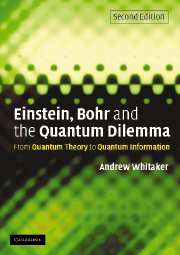Book contents
- Frontmatter
- Contents
- Preface
- Acknowledgements
- 1 Bohr and Einstein: Einstein and Bohr
- 2 The peace before the quantum
- 3 A glance at relativity
- 4 The slow rise of the quantum
- 5 Bohr: what does it all mean?
- 6 Einstein's negative views
- 7 Bell and non-locality
- 8 A round-up of recent developments
- 9 Quantum information theory – an introduction
- 10 Bohr or Einstein?
- References
- Index
3 - A glance at relativity
Published online by Cambridge University Press: 11 April 2011
- Frontmatter
- Contents
- Preface
- Acknowledgements
- 1 Bohr and Einstein: Einstein and Bohr
- 2 The peace before the quantum
- 3 A glance at relativity
- 4 The slow rise of the quantum
- 5 Bohr: what does it all mean?
- 6 Einstein's negative views
- 7 Bell and non-locality
- 8 A round-up of recent developments
- 9 Quantum information theory – an introduction
- 10 Bohr or Einstein?
- References
- Index
Summary
The idea of relativity
Probably all of us have had the experience of sitting in a stationary train, and suddenly seeing a train on an adjacent track moving (or appearing to move) past our own. The doubt is there because it might not immediately be quite clear whether we are indeed still stationary and the other train is moving, to the right, say, or whether it is stationary and we have begun moving to the left.
In fact, all our normal actions in the train – sitting, eating, drinking, walking, may be carried on in exactly the same way, irrespective of whether our train is moving or not – at least so long as the motion is at constant speed in a straight line. Could this be raised to the status of a principle – ‘All laws of physics are the same in the two circumstances’? Answering this question is the subject of this chapter [30, 31].
It may perhaps seem at first sight rather a dry formal question. In fact in the previous chapter I hinted at the important part it played in Galileo's argument on the movement of the Earth. But it has a more general importance even than this. If such a principle is adopted, it puts considerable restrictions on the laws of physics – in fact it ends up by making most of classical physics unacceptable.
- Type
- Chapter
- Information
- Einstein, Bohr and the Quantum DilemmaFrom Quantum Theory to Quantum Information, pp. 72 - 88Publisher: Cambridge University PressPrint publication year: 2006



